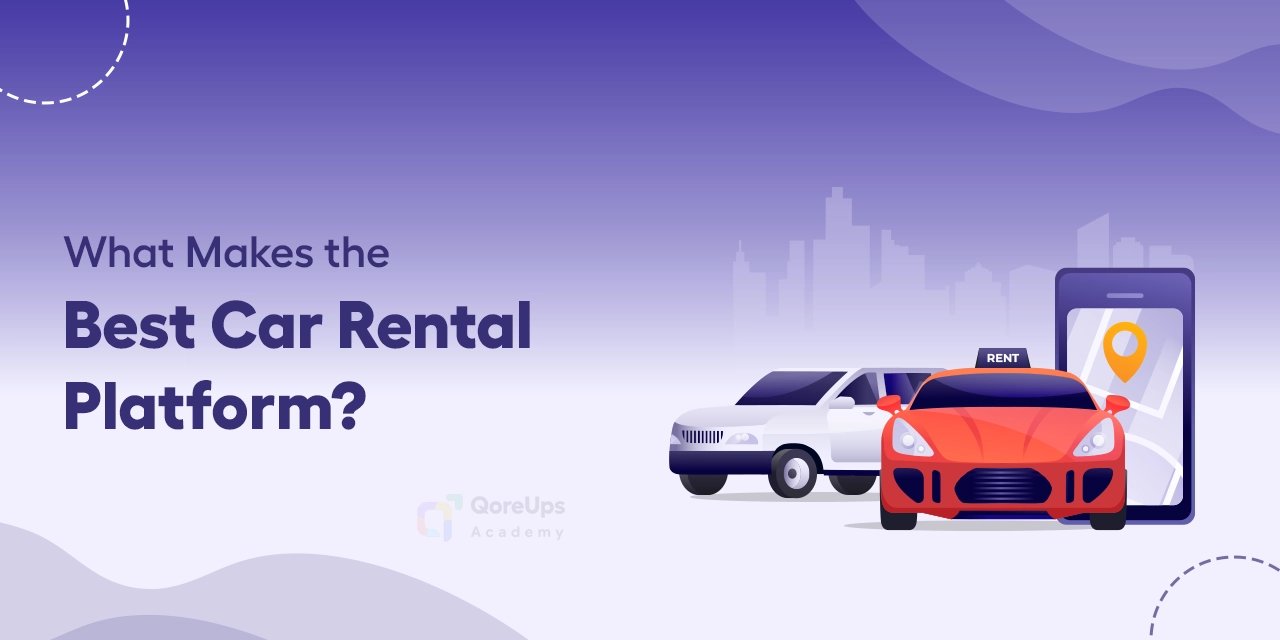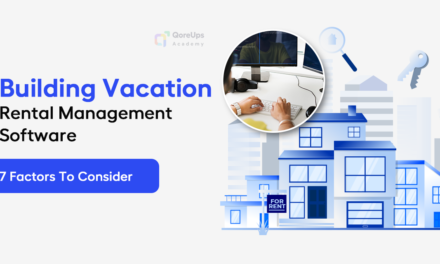Are you thinking of starting your own car rental business?
That’s a great idea! Because you’re going to step into a fast-growing market that’s full of opportunities.
In fact, the global car rental industry is indeed experiencing notable growth. And it is projected to reach $135 billion by 2030, with digital platforms driving much of that growth.
The success of your startup largely depends on the quality of the platform you provide to your users.
In this guide, we’ll explore the key qualities that make the best car rental platform. These insights will help you create a platform that stands out in this market.
Are you ready? EXCELLENT!
Let’s dive in…
Top Qualities of the Exceptional Car Rental Platform
Discover the supreme features that set the best car rental platforms apart.
1. Ease of Use: Your Platform’s First Impression
The user interface (UI) and user experience (UX) of your car rental platform are everything.
Your customers — whether they’re tourists, corporate clients, or locals — expect the booking process to be smooth.
If your rental platform feels confusing and lags often, you’re losing the business.
💡 Did you know? 74% of users abandon a platform if it is too complicated to use and takes longer than five seconds to load.
Features that Simplify the Rental Process:
- Simple search and filtering system
- Responsive mobile interface
- Clear “Book Now” button
- Fast load times
2. Fleet Variety: Attract a Broader Market
The more vehicle types you offer, the more customers you’ll attract.
Whether you own your fleet or plan to use a peer-to-peer (P2P) model like Turo, your platform must be able to handle multiple vehicle categories.
From fuel-efficient compacts to electric cars and luxury sedans, variety is key.
Must-Have Fleet Features:
- Categories: economy, SUV, EV, van, luxury
- Real-time availability tracking
- Vehicle photos and specifications
3. Pricing Transparency: Key to Building Trust
Entrepreneurs often overlook pricing clarity, but it’s a critical factor for long-term success.
Hidden fees or unclear rental costs are the fastest way to lose customers and get negative reviews.
Your car rental platform should show all the costs upfront, including:
- Daily or hourly rental rates
- Taxes and service fees
- Insurance options (with pricing)
- Mileage limits and any extra mileage costs
- Fuel policies and potential refueling charges
- Additional driver fees
- Late return fees
- Extras cost (GPS, child seats, etc.)
Business Tip
Regularly adjust your rental fees based on factors like demand, seasonality, and location. Staying flexible with your pricing helps maximize profits.
💡 Do you know how much money does a car rental business makes?
4. Booking Flexibility: Adapt to Changing Plans
These days, customers expect flexibility to be a basic part of the service.
Whether it’s changing their booking last minute, canceling without extra fees, or picking up and dropping off the car at different times or locations, offering flexible options makes your platform much more appealing.
If your service is too strict, people will quickly look elsewhere.
Your platform should allow your customers to:
- Modify bookings easily
- Extend rental durations
- Cancel with no/minimal penalties
Having easygoing policies makes your platform more welcoming, especially among travelers and business customers who often deal with last-minute changes.
5. User Reviews & Ratings: Social Proof Sells
People trust people more than marketing copy.
That’s why the best car rental platforms encourage user-generated reviews.
Showing reviews and ratings on your platform helps build trust because new customers can see honest feedback from people who have already used the service.
This makes it easier for them to pick the best car or the most reliable host on the platform.
If you’re using a Peer-to-Peer model, reviews encourage car owners to maintain quality standards.
💡 Fact: 69% of renters look at ratings and reviews, while 84% said that these ratings significantly influenced their leasing decisions.
What to Include?
- Star ratings for vehicles and hosts
- Written feedback
- Photo or video reviews from customers
- Customer satisfaction percentages
6. Data Privacy: Protect Your Platform and Customers
Protecting your customers’ personal information isn’t just about following the law. It’s about earning their trust.
If your platform collects sensitive data like driver’s licenses, addresses, or payment details, you need to make sure you’re following important privacy rules like Europe’s GDPR, California’s CCPA, or Canada’s PIPEDA.
Your Platform Must Include
- GDPR-compliant data handling
- Encrypted payment processing
- Two-factor authentication (2FA)
- User control over data sharing and deletion
💡 Did you know? 94% of businesses say their customers wouldn’t feel comfortable buying from them if they didn’t handle personal data responsibly.
Implementation Tip: Choose a car reservation software that already follows GDPR rules. This means the software is designed to protect customer data — like names, addresses, driver’s licenses, and payment info — in a safe and legal way.
Using a GDPR-compliant system can:
- save you time
- help you avoid legal trouble
- build trust with your customers right from the start
7. Customer Support: Stay Available, Stay Trusted
Great car rental platforms do more than just let people book vehicles: they make life easier.
Whether it’s helping someone find a car at the last minute, offering flexible pickup options, or providing quick customer support during a trip, the best platforms take the rental experience to the next level.
Your platform should provide:
- 24/7 customer support
- In-app live chat or phone support
- Instant help during emergencies (e.g., breakdowns during trips)
Offering excellent customer service is a proven way to differentiate your startup from bigger brands.
8. Trust and Safety: Keep Everyone Secure and Confident
Both customers and vehicle owners want to feel safe when using your platform — especially if you’re running a peer-to-peer (P2P) model where people rent out their own cars. When people feel confident that they’re protected, they’re much more likely to use your service again and recommend it to others.
To build trust and safety, your platform should include:
- Driver’s license verification
- Users background checks
- Insurance plans
- GPS tracking for vehicles
- In-app reporting
By putting these trust and safety measures in place, you create a secure environment for both renters and vehicle owners. It shows that your platform takes responsibility seriously. In the rental market, trust is everything.
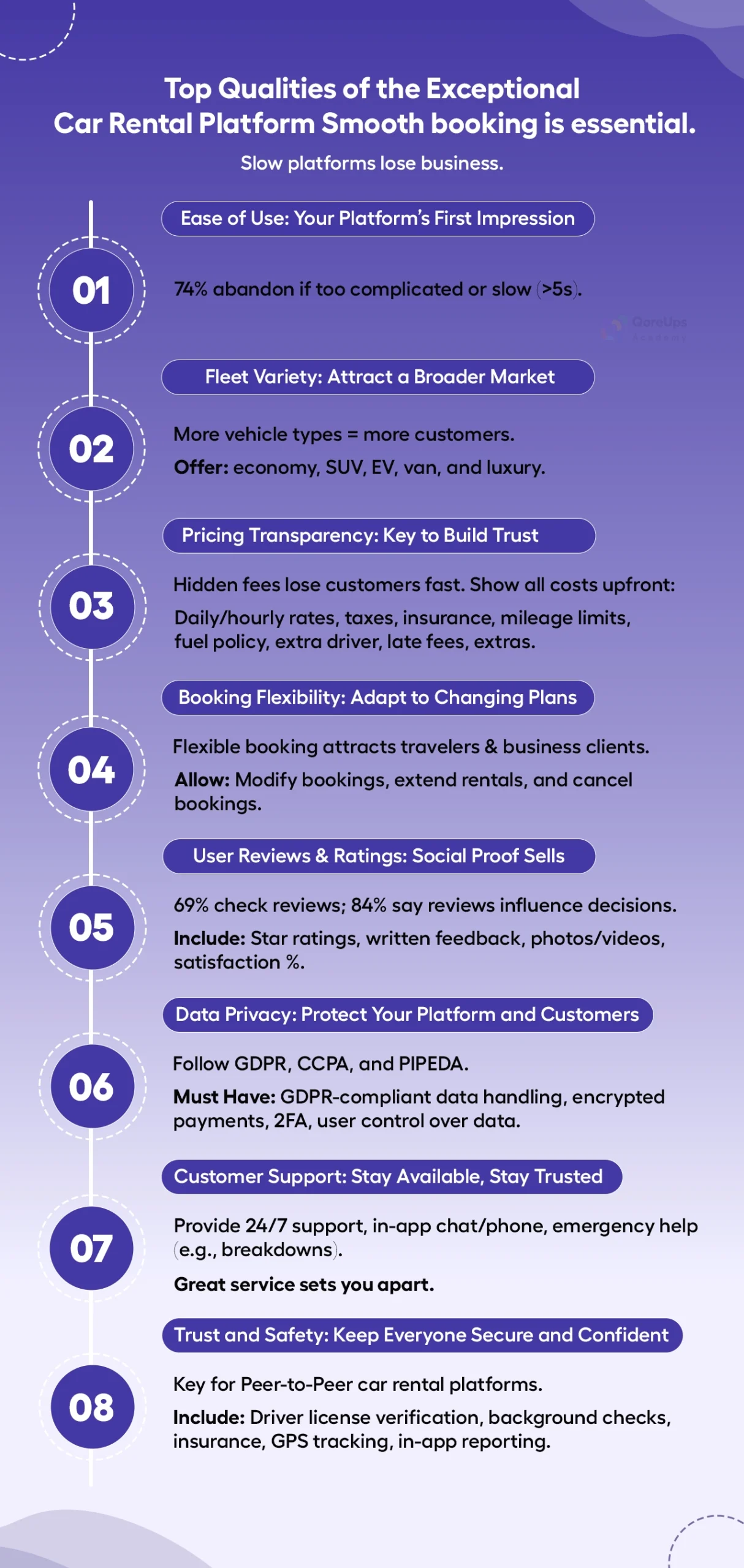
What Leading Car Rental Platforms Do?
If you’re building a car rental platform, it’s a good idea to see what others are doing well. Here’s a quick comparison of the top car rental platforms. Let’s analyze and learn from them:
Turo – Rent Cars from Other People
Turo is a peer-to-peer (P2P) car rental platform, which means regular people can rent out their own cars. You can find a lot of different types of vehicles, and the app is easy to use.
- What’s good: Lots of car options, modern and simple app.
- What’s not so good: You have to trust strangers, which might worry some users.
Getaround – Quick and Easy Car Sharing
Getaround also uses the P2P model, but focuses on hourly rentals. It lets you unlock cars through the app, so no need to meet the owner. Great for short trips in the city.
- What’s good: Fast, flexible rentals; no keys needed.
- What’s not so good: Only available in a few cities.
Enterprise – Traditional Rental Company
Enterprise owns its cars and rents them out from branches. It’s popular with businesses and has a strong reputation.
- What’s good: Trusted brand, many locations.
- What’s not so good: Less flexible, usually more expensive.
Hertz – Big at Airports
Hertz is known for renting cars at airports. Like Enterprise, it owns its fleet.
- What’s good: Easy to find at most airports, well-known company.
- What’s not so good: Old-fashioned tech, high prices.
Avis – Worldwide with Rewards
Avis is a global company with its own fleet of cars. It also offers a loyalty program for frequent users.
- What’s good: Available in many countries, good rewards for regular users.
- What’s not so good: App and website could be better, strict rental rules.
Key Takeaway
These companies show different ways to run a car rental business. Some focus on convenience and variety (like Turo and Getaround), while others offer reliability and reach (like Enterprise, Hertz, and Avis). If you’re building your own platform, think about how to mix the best of both worlds—flexibility, trust, and a great user experience.
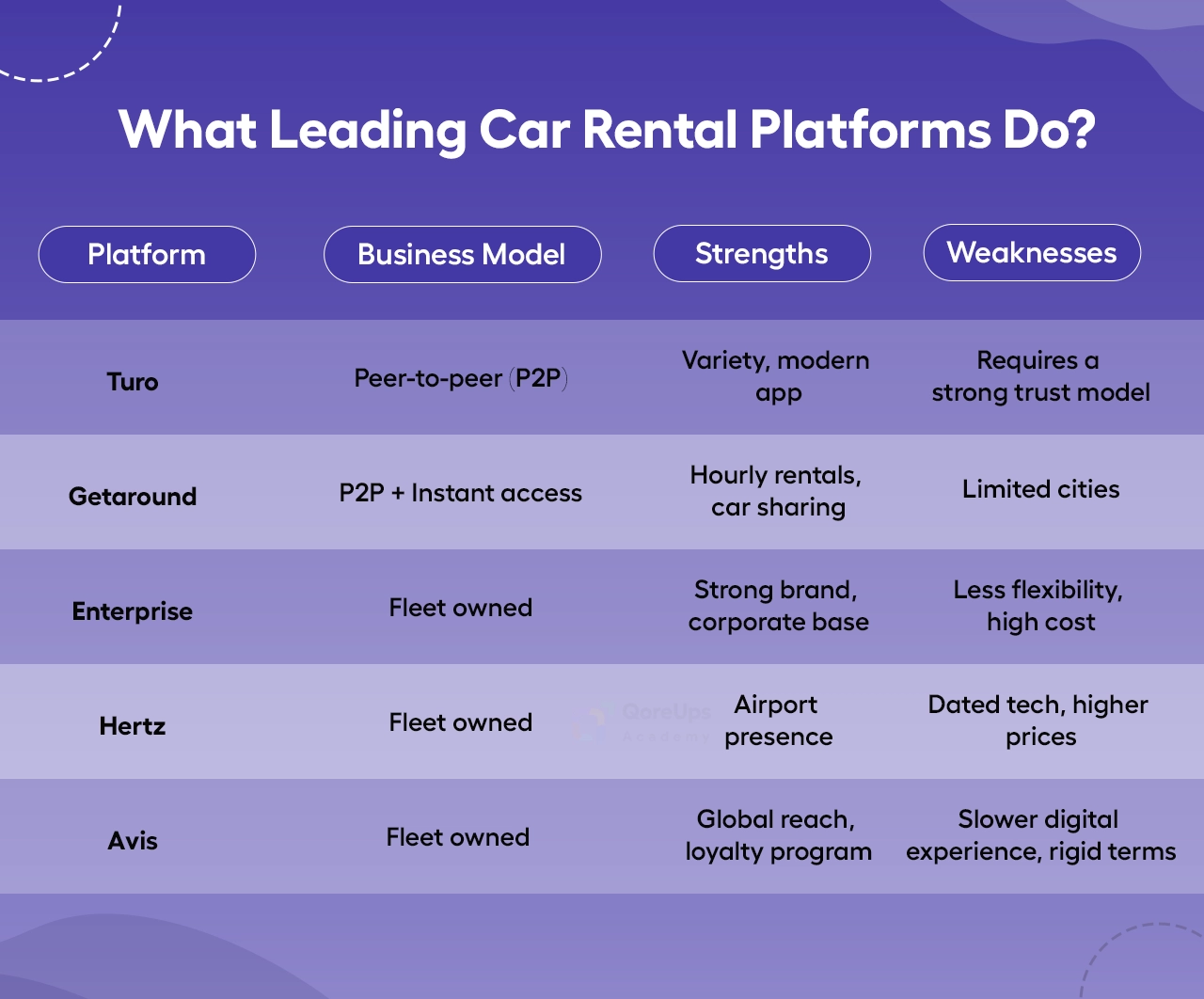
Checklist for Entrepreneurs Launching a Car Rental Platform
Launching a car rental platform? Here are the key things you need to get right to make sure your platform is successful and trusted by users:
1. Easy to Use
A simple user interface builds confidence and reduces drop-offs. If users can search, compare, and book a car in just a few steps, they’re more likely to return and recommend your service.
- Make sure the website or app is simple and quick to use.
- The booking process should be smooth—from search to checkout.
2. Vehicle Variety
People rent cars for different reasons: road trips, business meetings, family travel, or just getting around town. Offering everything from economy cars to premium SUVs ensures you can serve a wide range of users.
- Offer different types of cars to match different needs and budgets.
- Give car owners (or fleet managers) tools to easily add and manage vehicles.
3. Clear Pricing
No one likes surprise fees. Showing a transparent price breakdown at every step builds trust and avoids last-minute booking cancellations. It also reduces customer service issues later on.
- Show all fees up front—no hidden charges or surprises.
- Let users see what they’re paying for before they book.
4. Flexible Booking Options
Plans change. Your platform should allow easy modifications or cancellations with fair terms. Supporting one-way trips or multiple locations also appeals to travelers who want convenience.
- Allow changes and cancellations with fair policies.
- Support multiple pickup and drop-off locations if possible.
5. Customer Reviews
User feedback is a powerful trust signal. Verified reviews help new users feel safe about who they’re renting from or to. A clear review system also encourages better service from both hosts and renters.
- Let users leave feedback after each rental.
- Only show reviews from verified users so they can be trusted.
6. Data Privacy
Handling user data comes with big responsibility. Meeting global privacy standards (like GDPR and CCPA) and securing all personal and payment info shows your users that their safety—online and offline—is a priority.
- Protect user information and follow data privacy laws (like GDPR or CCPA).
- Keep all personal and payment data secure.
7. Strong Customer Support
Problems don’t wait for business hours. Fast, round-the-clock support—especially live chat and emergency help—can turn a bad experience into a loyal customer. It’s also essential for managing roadside incidents or last-minute booking issues.
- Offer 24/7 support through chat, email, or phone.
- Make sure users can get help quickly—including during emergencies (like roadside issues).
8. Trust and Safety
This is the backbone of any rental platform. Driver verification, insurance options, and safety tools like GPS tracking help prevent issues and give everyone peace of mind. The safer users feel, the more likely they are to book again.
- Verify drivers and car owners properly.
- Include insurance options, GPS tracking, and background checks if needed.
Key Takeaway
Don’t just build a platform—build confidence. Every feature on this checklist adds to a user experience that’s smooth, secure, and worth coming back to. Before you dive into building your platform, make sure you understand the full process of starting the business. Here’s a step-by-step guide on how to start a car rental business.
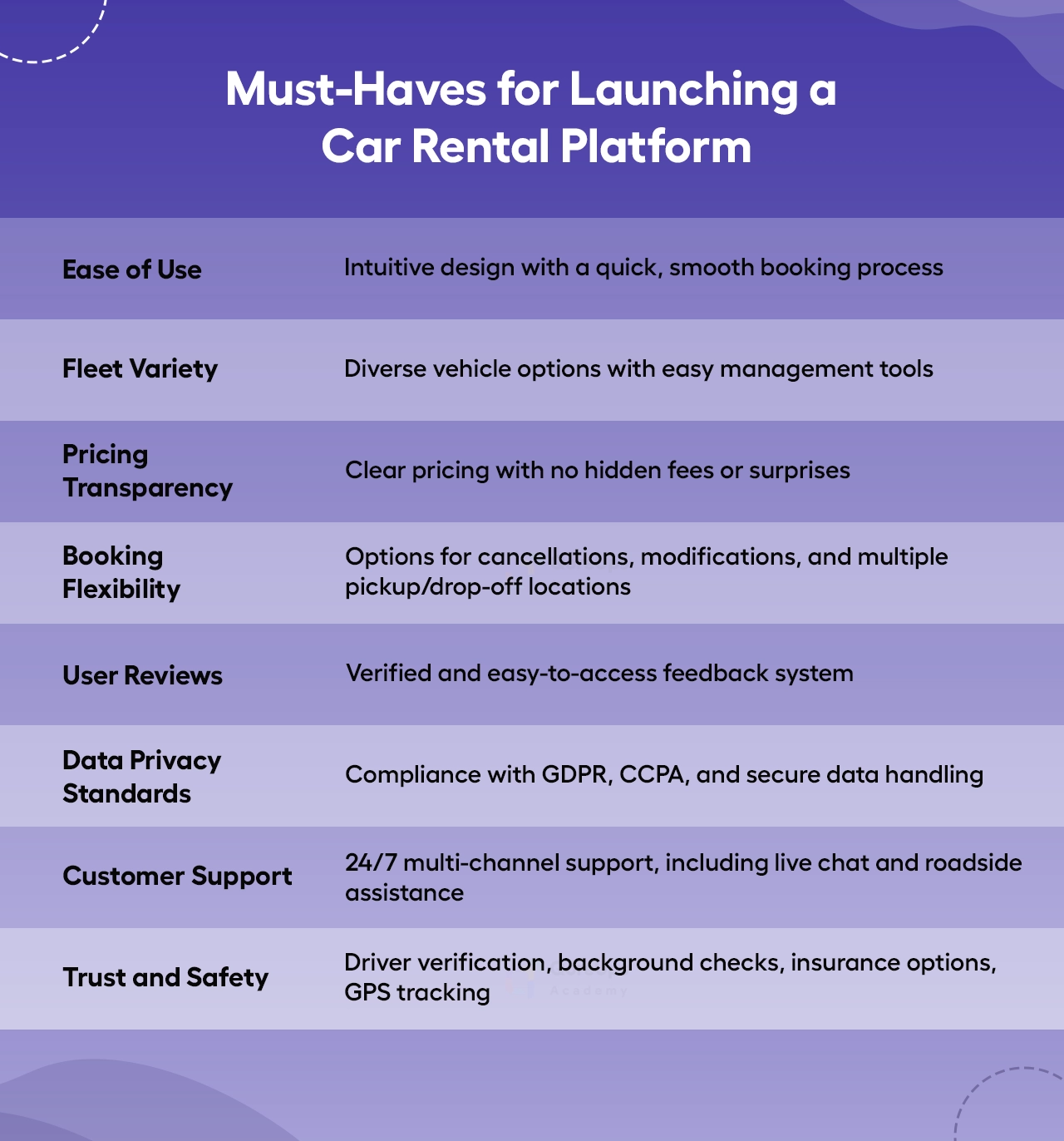
Final Thoughts
Creating the best car rental software is about building a reliable, scalable, and customer-first solution that helps people book cars confidently.
Whether you’re building from scratch or starting with a SaaS car rental software, remember: the user experience, data safety, and flexibility are what make the brand.
See why QoreUps is one of the best online car rental software platforms in the USA.
Using the right car rental booking software, being clear about prices, and having a good way to run your business will help you succeed in the long run.

